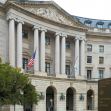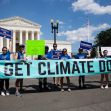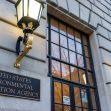The Environmental Protection Agency announced this week that it has finalized a rule that will determine what research is used when creating public health policies and protections. The final rule, titled Strengthening Transparency in Pivotal Science Underlying Significant Regulatory Actions and Influential Scientific Information, has been met with criticism from many in the scientific community.
The main mission of the rule reads in part, “ help strengthen the transparency of the dose-response data underlying certain EPA actions and to set the overarching structure and principles for transparency of pivotal science in significant regulatory action and influential scientific information.” The term dose-response data is used to describe experimental studies done on animals, humans, and other organisms.
The issue lies in the fact that dose-response studies often include the private information of individuals who participated in the study - information that would generally not be released to the public because of patient confidentiality and other privacy laws.
While the new rule itself does not explicitly state that dose-response studies will be excluded when developing public health protections, the rule does emphasize the need to look at the raw data associated with certain studies. One of five initiatives in the rule explains, “The EPA is requiring that, when promulgating significant regulatory actions or developing influential scientific information, the Agency will determine which studies constitute pivotal science and give greater consideration to those studies determined to be pivotal science for which the underlying dose-response data are available in a manner sufficient for independent validation.”
According to many who oppose the rule, if the data is unattainable because of patient confidentiality, then by default crucial studies that offer scientific evidence on how different toxins and chemicals impact humans and our environment might be left out of consideration when public health policies are drafted.
Scientists and Formal EPA Officials Weigh In
Scientists and former EPA officials alike have weighed in with criticism about the new rule. Many have described it as a way to further pull the credibility of science from public policy. The former director of the EPA’s Science Advisory Board, Chris Zarba, explains that “The people pushing it are claiming it’s in the interest of science, but the entire independent science world says it’s not.” Zarba adds, “It sounds good on the surface. But this is a bold attempt to get science out of the way so special interests can do what they want.”
In response to the EPA's rule that they will prioritize dose-response data that can be independently validated, the director of the Union of Concerned Scientists’ Center for Science and Democracy Andrew Rosenberg shares, “As a well-experienced peer reviewer, I very rarely scrutinize raw data. Rather, I look at data collection and analysis methods, summary and other statistics and graphics and results and conclusions to determine the validity of a study and the strength of its scientific evidence.”
Thomas Sinks, who also worked with the EPA as the leader of the Office of the Science Advisor, wrote an op-ed in The Hill expressing his dissatisfaction with the new rule.
Sinks blasted the new rule for including his name and his office, implying that he participated in the creation of the rule when he maintains he did not. Sinks explains, “Research involving human subjects is the most susceptible to being blocked. Yet, it is also the most informative.” He adds, " would allow politicians to ignore epidemiological studies that have been critical in setting protective air standards. Many of these studies rely on personal information that, if disclosed, would violate laws that protect study participants.”
While supporters of the new rule are largely outnumbered, both the American Chemistry Council and the primary trade association for U.S. chemical companies came out expressing their acceptance of the new rule. Jon Corley, a spokesperson for the ACC, explained in a statement that "the new rule will strengthen EPA’s regulatory process by helping ensure that it is relying on the best available science — science that is reliable and unbiased — and by making the underlying research and data publicly available in ways that protect personal privacy, confidential business information, proprietary interests, and intellectual property rights.”
As the passage of the new rule is adopted into the EPA, many analysts point to this being the last-ditch effort of environmental rollbacks by the Trump Administration. While the incoming administration could certainly repeal the new rule, that is likely to take months or even longer.






